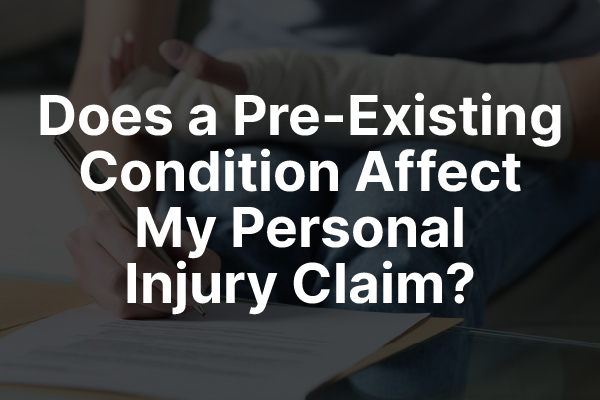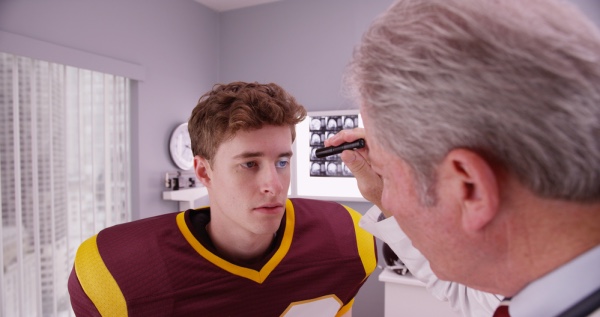
The aftermath of an accident is extremely challenging for every individual involved. Not only were the plans that you had suddenly derailed, but resulting injuries can change the direction of your entire life. While the emotional and physical stress of trying to get your life back on track can seem overwhelming, many individuals find some peace knowing that they can seek monetary compensation to cover medical expenses and damages.
However, those suffering from a pre-existing condition may find less comfort in this thought, knowing that insurance companies may try to devalue or deny their personal injury claim due to their condition. The team at the Hernandez Law Group, P.C. understands that this kind of shady practice can result in the accident victim suffering more than they should, making the road to recovery incredibly difficult. We do not stand for this kind of behavior and will fight hard to ensure that our clients get the compensation they deserve. Use this guide to better understand how a pre-existing condition can affect a car accident claim.
What Is a Pre-existing Condition?
Legally, a pre-existing condition is defined as any medical issue that an individual had before their accident. Some pre-existing conditions can be made significantly worse by the impact of an accident. These conditions include but are not limited to:
- Herniated discs
- Muscle strains
- Arthritis
- Broken bones
- Traumatic brain injuries (TBIs)
- Hernias
- Deep vein thrombosis
How Common Are Pre-Existing Injuries?
Pre-existing conditions are extremely common in the United States. According to a study done by Georgetown University, chronic back pain is one of the most common pre-existing conditions. 16 million adults suffer from chronic back pain, or 8% of the adult population in the United States.
How Is Compensation Calculated for Aggravating a Pre-existing Condition?

The State of Texas recognizes a legal doctrine known as the “eggshell skull rule.” This doctrine states that the defendant is liable for the plaintiff’s unforeseeable and uncommon reaction to the defendant’s negligent actions or intentional tort. In layman’s terms, if an individual’s negligent behavior, such as speeding, results in an accident and that accident aggravates or worsens an individual’s pre-existing condition, the defendant is responsible.
For example, a driver has a pre-existing spinal deterioration condition. As they drive home from work, they are hit by a driver who sped through an intersection. The accident resulted in the first driver suffering paralysis. The defendant will be held liable for the accident, including the paralysis, even though the same accident may not have had the same impact on a healthy person.
The Dangers of Trying to Conceal a Pre-existing Condition
Individuals injured in an accident often try to hide their pre-existing conditions out of fear that they won’t be treated fairly or be able to recover damages. However, trying to conceal a pre-existing condition is the main reason why individuals lose the right to fair compensation. This is because:
- Your injury attorney won’t be able to properly prepare your case without complete and accurate information.
- Expert witnesses on your side will not be able to speak with authority or accuracy if they do not have the right information.
- The responsible party’s insurance provider will investigate and most likely uncover the fact that you were trying to hide a pre-existing condition.
- The insurer may be unwilling to negotiate a settlement if they learn that you have intentionally concealed information.
- The judge and jury may not trust you and think that you are lying about other aspects of the case since you hid the pre-existing condition.

If you have been in an accident and have a pre-existing condition, be fully transparent with your personal injury attorney. Our team can help you handle the insurance company—if we know the full extent of your case and all the facts.
It is also important to be careful about what you say and what you sign when dealing with insurance companies. While you definitely shouldn’t lie to them, you are not obligated to answer every question as soon as it is asked, and you should never sign a document as soon as you receive it. Make sure you talk with your personal injury attorney to ensure that you are being treated as fairly as possible in your case.
The Team That Fights for You
The team at the Hernandez Law Group, P.C. fights hard to defend the rights of every Texan in DFW, Abilene, and Amarillo, Texas. We do not let the insurance companies bully our clients, nor do we allow our clients to be treated unfairly due to a pre-existing condition. If you or a loved one was hurt in an accident and are seeking medical and damage compensation, call our team today. We will schedule your free no-obligation consultation to go over the facts of your case and ensure that your road to recovery is smooth.
